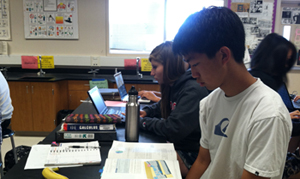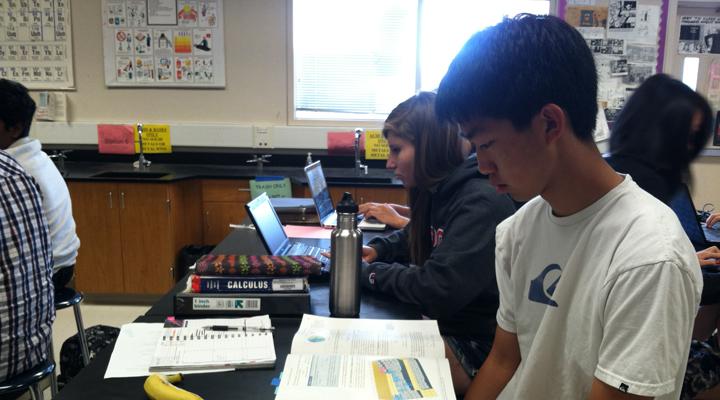
Come June, junior Stephen Ting will head down to the US Air Force Academy in Colorado — not to fly airplanes, but to study chemistry.
The study camp, held from June 5 to June 20 and organized by the American Chemistry Society, follows a two-part selection process to identify and acknowledge high-achieving chemistry students. High schoolers participated in regional Chemistry Olympiad exams; the top two from each regional competition advanced to a national one; and the top 20 from the national test, including Ting, have been invited to attend the camp, where they will study chemistry — primarily organic — under mentors. The top four students at the camp will go on to represent the United States in the International Chemistry Olympiad, to be held July 21 to July 30 in Washington, DC.
Ting first became exposed to chemistry when he took a class on the subject in the summer preceding freshman year — just something his mom signed him up for, he said. But this school year, he realized: “Hey, [chemistry] is pretty cool.”
He first began preparing for the test around December of 2011, when he took a practice test after a classmate suggested that he might do well. By March, when the regional MVHS exam was administered on campus to approximately 40 students, Ting felt fairly confident. He and junior Daniel Yeung achieved the top two test scores and advanced to the national competition.
“Even to be a semi-finalist from Monta Vista itself is [such a] big [accomplishment] because every kid is so smart here,” Ting’s AP Chemistry teacher Kavita Gupta said. “They’re so hard working, they’re so driven, they want to do their due, and they want it so bad.”
Both the local exam and the national one — which consists of multiple choice and free response sections as well as a lab practical — include some topics not covered in the AP Chemistry curriculum. Material that would be covered in the first couple of months of a college-level organic chemistry course, for instance, is tested on the olympiad.
“Sometimes you hit a roadblock with something you don’t understand fully, or sometimes you come across [a topic for which] you just have to accept that things happen, which is what a lot of people think sucks about chemistry,” Ting said.
Ting also emphasized that students should not take the test simply because their parents desire them to do so, or because they want another badge to put on their college applications. According to Ting, learning the new concepts requires self-motivation, which stems from a genuine interest in chemistry.
“When you see organic molecules, and they have all these complex geometric structures, and they have all these rings, and all these rings coming out of rings … it just kind of looks cool,” Ting said. He added that some problems, such as those that ask students to outline the steps to synthesize a certain molecule, “are almost like puzzles or riddles. They’re fun to figure out, and it’s really rewarding when you do figure it out.”
Ting, along with Yeung, worked with Gupta to train for the lab practical, a component of the National Chemistry Olympiad. Gupta opened up her room and provided laboratory supplies to the students some days during seventh period and after school, and once during Spring Break. According to Gupta, the support she gave to Ting was minimal — most of his success is due to his own initiative, she said.
“I didn’t come in his way. These kids are just so smart,” Gupta said. “[I] just [steered] the ship a little bit because based on my experience, I know what kind of questions are asked [on the Olympiad]. I’m just lucky to be able to serve this kind of population and to be working with these kinds of students.”
Ting and approximately 1000 other students from across the nation took the national exam late April, at Las Positas College in Livermore, California; coming out of it, he thought his lab practical was “pretty sloppy.”
A few weeks later, Gupta called Ting to the front of the room during AP Chemistry class — “Did I forget to turn in another homework?” Ting thought to himself. She told him that he had advanced to the next round of the Chemistry Olympiad. Yeung did not place in the top 20.
“[What] surprised me is when you imagine kids that go to a camp … to learn chemistry, you think of them as doing nothing but chemistry for the entire day,” Ting said. “But I feel like I’m a pretty normal student … The fact that I made it without having buried my head in a chemistry book for the last sixth months [was surprising].”
Gupta emphasized Ting’s work ethic, curiosity and desire to learn.
“And he’s very humble, on top of that,” Gupta said. “And that’s a quality that I personally really treasure. Because when you’re humble, then you want to learn.”
And Ting has quite a bit more learning, or at least studying, left to do: The American Chemistry Society has sent him a textbook and recommends that he read 22 chapters before the study camp starts. According to Ting, the camp consists largely of preparation for the international round, including lectures and lab work. Each day starts at 6 a.m., and the days at the camp are “packed with chemistry.”
Although Gupta noted that Ting and Yeung’s exam performances were “phenomenal,” she stressed the importance of acknowledging other types of achievement as well.
“Winning is great, but participating is very nice as well,” Gupta said. “Achievement by my star students is so overwhelming, … as is … an ‘F’ student, who, with a lot of hard work, goes to a C … As long as you can better yourself, and better your own performance, you are a winner.”








